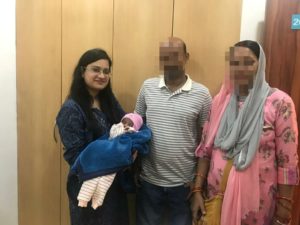PCOS or Polycystic ovary syndrome is the largest cause of infertility in women.It is a hormonal imbalance situation in women that cause irregularity in periods and difficulty in conceiving.
Regardless of your age, consult with Dr. Neha if you have not fallen pregnant within six months if you have any of the following:
●● irregular or absent menstrual periods
●● history of pelvic infection
●● two or more miscarriages
●● history of using an IUD for birth control
●● prostate infections in the male partner
●● sterilisation reversal in either partner
●● difficulties with sexual intercourse
●● chronic pelvic pain
●● breast discharge
●● history of sexually transmitted disease
In a normal mensturating woman ,large number of follicles containing eggs are present in each ovary. Every month several follicles begin to develop but only one of the egg is matured and released from the ovary . In polycystic ovaries, the follicles do not develop properly; as a result a woman with polycystic ovaries will not ovulate regularly. This leads to irregular periods and difficulty in conceiving.
• The causes for PCOS are to date unclear, however, it is widely believed that the most common causes are genetic, obesity, high blood pressure, and insulin resistance.
If even after regular and unprotected intercourse,a women is not able to concieve,following symptoms may indicate polycystic ovaries:
• abnormal menstrual cycle
• Absence or delay of periods
• scanty menses
• excess weight gain
• Excess facial and body hair
• Acne
• hair loss
• oily skin
• discomfort in the pelvic area
• difficulty getting pregnant
Your doctor generally requires a series of test to diagnose PCOS. These tests include –
1. Physical Examination:
Your doctor measure your weight and waist and Calculate your BMI, observe abnormal hair growth in unwanted parts like face, chin or chest etc.
2. Pelvic ultrasound: to detect the presence of cysts in one or both ovary in typical “string of pearl” apperance.The presence of polycystic ovary does not mean you have PCOD.
3. Blood Tests:
Physical evidences generally lead to a battery of tests like Serum Prolactin ,TSH, T3, and T4.Hormone Tests (FSH, LH, Testosterone, Estrogen, Androgen)
There is no definite cure for PCOS so far. It can be eliminated or reversed through a strict lifestyle modification but it is not completely cured. The women with PCOS have to maintain a healthy weight, follow a strict diet chart, avoid stressful situations and take medication regularly, to help reverse or control PCOS .It can be reversed through weight loss but weight loss in itself is difficult with PCOS.
• PCOS if left untreated, it may contribute to severe infertility and may lead to chronic conditions like Diabetes, Blood Pressure ,Heart Disease, Depression and Anxiety which is inarguably more challenging to treat. Therefore, timely and proper treatment of PCOS is essential for your physical and emotional wellbeing.
Once a PCOS diagnosis is confirmed, your fertility specialist Dr. Neha Singh will work with you to determine the treatment best suited to your individual condition and treatment goals.Through treatment protocols customised for each patient, Dr. Neha have successfully treated numerous women living with PCOS and PCOS-related infertility.
Long Term Effect Of PCOD
• Impaired glucose tolerance and Diabetes.
• Obesity
• Cardiovascular disease
• Hypertension
• Lipid abnormality
• Endometrial cancer
• Ovarian cancer
• Breast cancer
• Depression and mental health
For more information or to schedule an appointment, Contact Us Now!

